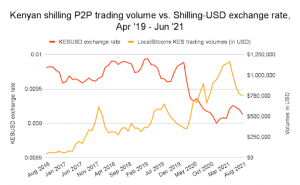
A wide number of heterogeneous factors drive digital asset adoption throughout the world. In the case of many African countries – and especially Kenya – we find three main drivers:
- The weakening of its local currency,
- Inefficient value-transfer mechanisms,
- An unclear legal landscape and treatment.
We will review the above factors and how they affect digital asset adoption in Kenya.
i) Weakening local currency
Similarly to many Latin American countries – and several African regions – the Kenyan currency has been depreciating against the US dollar since December 2019. The case for inflation hedging and salary preservation has stepped firmly in Kenya. For example, a blog article from Chainalysis showcases the inverse relationship between the Shilling/USD exchange rate and the Kenyan shilling P2P trading volume [1].

ii) Inefficient value hold and transfer mechanisms
According to the World Bank’s Global Findex Database, Sub-Saharan African countries account for a large majority of total global unbanked adults (2017). This situation, on top of the weakening local currency, has forced Africans to turn to centralized exchanges and cryptocurrencies in the hope of finding an alternative way of circumventing the banking system. Therefore, people in Africa have been opting to send remittances using cryptocurrencies, resulting in cross-regional transfers; these transfers make up 96% of Africa’s cryptocurrency market.
The African regulatory authorities’ reactive solution was to make it difficult for banking customers to send money to cryptocurrency businesses; in the specific case of Kenya, banks have issued alerts to customers who used debit or credit cards to buy digital assets on centralized exchanges [2]. Yet this measure only drove cryptocurrency holders to turn once again to an alternative solution. Decentralized peer-to-peer (P2P) platforms filled this need and have become more popular than ever across Africa as a way of sending crypto. In fact, P2P lead exchange Paxful has seen growth trends that reached 57% for Nigeria over the last year and 300% in Kenya.
iii. Regulatory Framework
To this day, digital assets are neither regulated in Kenya nor backed by any governmental institution. This is a consistent theme for the past six years. Notwithstanding, the stance that the original public notice cautioning the public on virtual currencies [3] evolved into a more embracing exploratory analysis carried out by the official Distributed Ledgers Technology and Artificial Intelligence Task Force [4]. There are also discussions on whether they might be treated as securities and not currencies. This could potentially make them regulated under the securities act umbrella.
Current state of affairs
Digital assets fall under the scope of the The Central Bank of Kenya (CBK) through legal avenues and broad discretion. While the Kenya Money Remittance regulations and the AML Act are the major laws that govern cryptocurrency trading, cryptocurrency regulation falls under three acts in Kenya [5] [6]:
- The Capital Markets Authority (CMA), is the body in charge of regulating the securities public offering process through the Capital Markets Act. It is also responsible for detailing which assets are considered securities.
- The Central Bank of Kenya (CBK) on the other hand, supervises payment systems through the National Payments Systems Act – bringing all payment system providers under one regulatory roof, and ensures the safety and security of each one.
- Finally, additional regulations like the Kenya Information and Communication and Data Protection Act administered by the Communication Authority, the Banking Act, and others are and/or might become relevant depending on the official treatment of digital assets in the future.
Authorities build up interest
While the regulatory landscape remains static, there has been increased interest from governmental authorities. In March 2019, the Regulatory Sandbox Policy Guidance Note was issued to set a framework for the live tests of innovative fintech products. The program admitted seven firms earlier this year. Less than a year ago, the CBK Governor Dr Patrick Njoroge said in an online interview that the CBK had entered into discussions with other central banks on the possibilities of entering the digital currency space [6].
The path moving forward
To conclude, Kenyans’ desire to embrace blockchain continues to promote innovation in several financial spaces within the region. The effective use of the technology and its possibility to improve their industries also requires consistent and clear regulation – a task that must be addressed by all pertinent authorities. With this in mind, digital asset adoption in Kenya will continue to expand and make cause changes in the traditional finance sector.
References
[1]“P2P Platforms, Remittances, and Savings Needs Power Africa’s Grassroots Cryptocurrency Adoption.” Blog, Chainalysis, 14 Sept. 2021, https://blog.chainalysis.com/reports/africas-grassroots-cryptocurrency-adoption.
[2] Crawley, Jamie. “Kenyan Banks Warn Customers about Buying Crypto: Report.” CoinDesk , 8 June 2021, https://www.coindesk.com/markets/2021/06/08/kenyan-banks-warn-customers-about-buying-crypto-report/.
[4] The Distributed Ledgers Technology and Artificial Intelligence Task Force. Ministry of Information, Communications and Technology (2019). Emerging Digital Technologies for Kenya – Exploration and Analysis. Available at: https://www.ict.go.ke/blockchain.pdf.
[5] Njogu, Muthoni. “Blockchain & Cryptocurrency Laws and Regulations: Kenya.” Global Legal Insights, Global Legal Group, https://www.globallegalinsights.com/practice-areas/blockchain-laws-and-regulations/kenya.
[6] Imani, Kevin. Kenyan Regulators’ Response to Growing Blockchain & Crypto Adoption. Sankore 2.0, 30 Aug. 2021, https://medium.com/sankore2-0/kenyan-regulators-response-to-growing-blockchain-crypto-adoption-b201fe49f854.
Sources
- Chainalysis (2021). The Chainalysis 2021 Geography of Cryptocurrency Report. Chainalysis. Available at https://blog.chainalysis.com/reports/2021-global-crypto-adoption-index.

